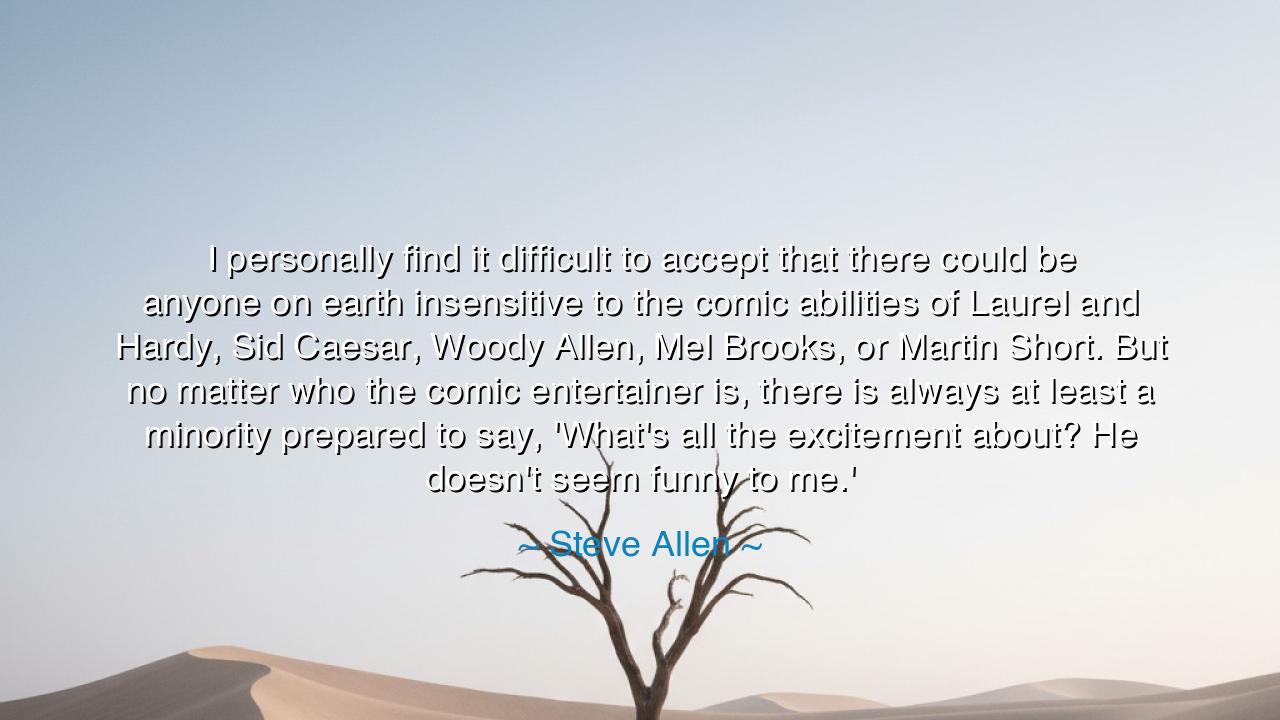
I personally find it difficult to accept that there could be
I personally find it difficult to accept that there could be anyone on earth insensitive to the comic abilities of Laurel and Hardy, Sid Caesar, Woody Allen, Mel Brooks, or Martin Short. But no matter who the comic entertainer is, there is always at least a minority prepared to say, 'What's all the excitement about? He doesn't seem funny to me.'






When Steve Allen said, “I personally find it difficult to accept that there could be anyone on earth insensitive to the comic abilities of Laurel and Hardy, Sid Caesar, Woody Allen, Mel Brooks, or Martin Short. But no matter who the comic entertainer is, there is always at least a minority prepared to say, ‘What’s all the excitement about? He doesn’t seem funny to me,’” he was not merely lamenting the mystery of taste — he was speaking of the profound subjectivity of art, of the eternal truth that beauty and laughter, though universal in reach, are never universal in reception. In his words lies a paradox that has existed since the dawn of creativity: that the very things that unite humanity — humor, music, storytelling — also divide it, for each heart resonates to a different rhythm.
The origin of this reflection comes from Allen’s lifelong devotion to the art of comedy and performance. As the creator of The Tonight Show, a writer, musician, and philosopher of humor, Allen spent his life exploring what makes people laugh — and why others do not. Having witnessed generations of entertainers rise and fall, he recognized that no matter how brilliant, how heartfelt, or how universally acclaimed a comic might be, there would always be those who remained untouched. This insight is not cynicism; it is wisdom born of experience. It is the humility of an artist who has learned that laughter, like love, cannot be forced, and that even genius must accept the limits of human perception.
In invoking the names of Laurel and Hardy, Sid Caesar, Woody Allen, Mel Brooks, and Martin Short, Allen was not simply praising individuals — he was naming archetypes of comedy’s spirit. These were men who shaped laughter itself, who, through timing and truth, revealed the absurdities of the human condition. Each possessed a different gift: Laurel and Hardy in their tender clumsiness, Caesar in his linguistic chaos, Brooks in his audacious parody, Woody Allen in his neurotic wit, and Short in his boundless energy. Together they represented the many faces of humor — from the silent to the sophisticated, from the slapstick to the cerebral. Yet even in their mastery, Allen knew there would be those unmoved by their brilliance. For humor, like sunlight, cannot enter every closed window.
This truth was known even to the ancients. The philosopher Plato, in his Philebus, once pondered the nature of laughter and found it rooted in contrast — the difference between what we know and what others fail to see. To laugh is to recognize, to perceive the hidden link between truth and folly. Yet not all minds perceive alike. One man’s jest is another man’s offense; one woman’s delight is another’s confusion. When Aristophanes performed his comedies in Athens, some laughed until tears filled their eyes, while others scorned his vulgarity and irreverence. The lesson of history, which Steve Allen so gracefully echoes, is that art does not exist to please all — it exists to awaken those who are ready.
And so, when Allen says he finds it “difficult to accept” that anyone could fail to see the humor of these masters, it is not arrogance — it is reverence. It is the awe of one who has tasted divine fire and cannot fathom how others do not feel its warmth. For laughter, in its purest form, is sacred. It is the sound of recognition — of humanity understanding its own foolishness and forgiving itself for it. To be “insensitive” to that is, in Allen’s eyes, to miss something essential about being alive. Yet, with gentle irony, he acknowledges that this is simply the way of the world: there will always be a minority unmoved by the universal.
This paradox — that what is universal is never unanimous — carries a profound lesson for every creator, leader, and dreamer. It teaches us that rejection does not negate worth. The fact that some fail to laugh at your comedy, or understand your art, or believe in your dream, does not diminish its truth. Even the masters were doubted. Even the brightest stars are invisible to those who refuse to look up. What matters is not whether everyone applauds, but whether your work carries honesty and heart. For if even a single soul laughs with you, learns from you, or feels seen because of you, then your offering has not been in vain.
So, my children, take this wisdom to heart: do not measure your worth by the applause of the crowd. Speak, create, and live with sincerity, and accept that not all will see what you see. Remember that every work of greatness — whether a joke, a song, a painting, or a dream — must pass through misunderstanding before it reaches immortality. Laughter, like truth, must find its audience in its own time. And when it does, it will echo across generations, as the laughter of Laurel and Hardy, the wit of Mel Brooks, and the insight of Steve Allen still do today.
Thus, let this teaching endure: seek not to please all, but to speak truly. For what one finds “not funny” today may one day be seen as genius. And in that mystery — in that cruel and funny timing of appreciation — lies the eternal comedy of life itself.






AAdministratorAdministrator
Welcome, honored guests. Please leave a comment, we will respond soon